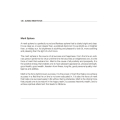spiritual journeys : ค้นหาหนังสือธรรมะ หน้า 7 / 31
หน้าหนังสือทั้งหมด

64
Dhamma Teaching on Sunday
Dhamma Teaching on Sunday
Every Sunday, those who come to visit Wat Phra Dhammakaya will be impressed from seeing people in white with joyful minds. The image of everyone, from all walks of life rega
Every Sunday, visitors to Wat Phra Dhammakaya are welcomed by joyful practitioners meditating together in harmony. Individuals from various backgrounds, cultures, and languages come together, embodyin

47
Teaching Your Unborn Child: The Spiritual Aspect of Conception
Being born a human requires not only the combination of the father's sperm and the mother's egg, but also the spiritual conception of the child in the womb. The tiny being can only begin life in the m
Being born requires the combination of sperm and egg alongside spiritual factors. Good parents can influence a child's positive reception in the womb. Preparation should start before pregnancy, focusi

116
Reflections on Family and Kammic Retribution
"Luang Phaw, I feel like my father takes unfair advantage of my mother. He doesn’t care about his children and only looks after himself. He is only concerned about his own wellbeing. During tough time
In this discussion, a boy shares his concerns about his father's irresponsible behavior towards their family. Luang Phaw emphasizes the importance of understanding familial roles and the moral respons

82
Hiri-Ottapa: Understanding Shame and Fear of Wrongdoing
Hiri-ottapa – Shame and Fear of Wrongdoing
Hiri and ottapa are Pali words, meaning ‘shame of wrongdoing’ (hiri) and ‘fearful of the consequence of wrongdoing’ (ottapa). One who has hiri-ottapa is one
Hiri and Ottapa are pivotal concepts in Buddhism, representing the shame of wrongdoing and the fear of its consequences. Together, they foster a good moral conscience. Individuals devoid of these trai

15
Understanding the Role of Precepts in Buddhist Ordination
There are 227 precepts, which include rules, regulations, and traditions that serve as guidelines for those who are ordained. The precepts are tools that help define the differences between right and
The 227 precepts provide rules and guidelines for the ordained, defining right and wrong to help individuals strengthen their determination amidst life's challenges. They ensure that knowledge gained

6
Call to the Angels: Invitation to Devas
Citation for Call to the Angels
BLESSINGS: Aradhana - Invitation to Devas (www.buddhist-book.com)
“One day Sakka, the king of the Devas approached the Buddha and requested Him to invite the Devas to
This text reflects on a significant event where Sakka, the king of the Devas, requested the Buddha to invite the Devas to witness the recitation of Dhamma. This practice fosters protection for devotee

140
Understanding the Merit Sphere: The Source of Success and Happiness
Merit Sphere
A merit sphere is a perfectly round and flawless sphere that is utterly bright and clear. It is as clear as, or even clearer than, a polished diamond. It is as bright as, or brighter tha
The merit sphere is a flawless, bright sphere representing all success and happiness. It is the source of positivity, driving individuals from ordinary virtues to enlightenment. Merit sustains one's j

60
Journey of Spiritual Growth at YUWA CAMP
experience began at 8 at YUWA CAMP. With great happiness, she could see the crystal ball as big as a football and as bright as the mid-noon sun at the center of her body. It was larger and covered her
This narrative follows a young girl whose life transforms after attending YUWA CAMP at the age of 8. She experiences a vivid connection to a crystal ball symbolizing her inner self, which leads to dai

243
Dhaummakaya International Meditation Centers in Taiwan and Hong Kong
桃園法身雅修中心
Dhaummakaya International Meditation Center of Taoyuan
330 root no. 232
No.232 Chungkian Alley.
Taoyuan City 330
Tel +886-3-3771261
Mobile +886-922-521-0722
Email : [email protected]
台
Dhaummakaya International Meditation Centers are dedicated to promoting meditation and spiritual growth. Located in Taoyuan and Taichung, Taiwan, these centers offer a peaceful environment for individ

18
Understanding Dhammakāya and Theravāda Manuscripts
and is ‘spiritually reborn’. The dhammakāya becomes her new identity as the milk nourishes her spiritually. It is something she is given as a verbal teaching.
To add the material from the Apadānas is
This text delves into the doctrine of dhammakāya, representing a new spiritual identity that arises from teachings, akin to nourishment from milk. It connects the concepts found in the Agañña-sutta, i

42
Saddhā: The Criterion of Being the Tathāgata's Son
Saddhā: Criterion of being the Tathāgata's Son
The first point to be looked at is the criterion of being the Buddha’s ‘true son’ which is, in this passage, defined by means of his
irremovable confiden
This text discusses the criterion of being the Tathāgata's son, emphasizing the irremovable confidence (saddhā) in the Buddha. It defines this confidence as settled and unchangeable despite external i

75
The Early Years of the Buddha
www.dharmmakaya.or.th
THE BUDDHA'S LIFE
The Early Years
The Buddha was born in 566 B.C. as Prince Siddhattha Gotama, the son of King Suddhodana and Queen Maha Maya Dewi in the kingdom of the Sakyans,
The Buddha, born as Prince Siddhattha Gotama in 566 B.C., was the son of King Suddhodana and Queen Maha Maya in the Sakyans kingdom of North India. Predicted to become either a world leader or a Buddh

63
Interfaith Cooperation for Lasting Peace
C O-OPERATION
Interfaith Activities
The world of religion today is like a flower garden made beautiful by the diversity of colour and scent. In an age when the life of those in society is becoming in
The Dhammakaya Foundation has actively participated in interfaith dialogues and forums, promoting cooperation between different religions. These engagements aim to create a united approach to spiritua

178
Wat Buddha Temples in Europe
Wat Buddha Hamburg
Wilhelm Str. 34, D-21640
Horneburg, Deutschland
Tel: + (49) 041-6382-6924
E-mail: [email protected]
ITALY
Wat Buddha Milano
Via Dello Scoiattolo 7
21052 Busto Arsizio (VA), I
This document provides essential contact information for various Wat Buddha temples located in Europe, including Germany, Italy, Norway, Sweden, and Switzerland. The temples aim to promote Buddhist te

45
Dhammadayada Training and Mass Ordination
Dhammadayada Training and Mass Ordination
The Dhammadayada Training Programme was the prototype training course to round off undergraduate students' (age 20-35) academic knowledge with spiritual and
The Dhammadayada Training Programme serves as a prototype for combining academic knowledge with spiritual and ethical practices for undergraduate students aged 20-35. This initiative cultivates respec

64
Understanding Paccekabuddhas in Buddhism
91 While it is possible for a Paccekabuddha to teach an individual which finally leads to that person's enlightenment, he does not teach to a multitude of people in the same way as a Buddha does. Henc
The text discusses the distinct nature of Paccekabuddhas, who can guide individuals toward enlightenment but do not teach the masses like Buddhas. Their teachings emphasize solitude and are succinct,

67
Understanding Dhammakāya in Relation to Paccekabuddhas and Enlightenment
early texts that 'dhammakāya' must be singular. 100 In any case, the verse conveys the meaning that a Paccekabuddha has dhamma(s) as his body (or bodies), where 'dhammas' refers to the qualities perta
This study analyzes the term 'dhammakāya' and its relation to enlightenment. Dhammakāya is presented as a singular concept applying to both the Buddha and Paccekabuddhas, emphasizing that 'dhamma' ref

68
Dhammakāya and Noble Disciples
VI. Reference 3: Dhammakāya and Noble Disciples
Besides the term’s relation to the Buddha and Paccekabuddhas, a Pāli canonical reference mentions also the relation of dhammakāya with noble disciples.
In the context of Pāli texts, the term dhammakāya is linked to noble disciples as evidenced in the story of Gotamī, the great nun and Buddha's foster mother. As she approaches her passing, Gotamī refl

71
Understanding Dhammakāya and Enlightenment
1. The term dhammakāya is related to enlightenment. This agrees with our earlier observation regarding the relation of ‘dhammakāya’ to the Buddha and Paccakabuddhas.
2. Dhammakāya is not exclusive to
The term 'dhammakāya' signifies enlightenment and is not exclusive to the Buddha but can also be attained by his disciples, as indicated by Gotami's reference to 'my dhammakāya.' This term is interpre

52
Exploring Buddhist Concepts and Monastic Life
residence of Buddhist monks; monastic residence
(vedana) feelings or sensations; is one of pleasant, unpleasant, neutral
envy; hostile action
(in meditation) finding the right point of balance; right
เนื้อหานี้สำรวจแนวคิดที่สำคัญในพุทธศาสนา เช่น ความรู้สึกหรือเวทนา ความโชคร้ายในสังสารวัฏ และการใช้ชีวิตในที่อยู่อาศัยของพระสงฆ์ นอกจากนี้ยังมีการพูดถึงหลักศีลธรรมและคุณธรรมที่สนับสนุนการปฏิบัติที่ดีโด
